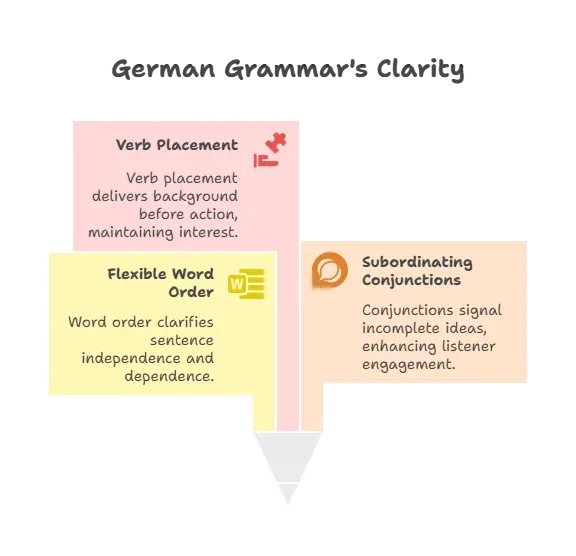Table of Contents
When speaking German, subordinate clauses, also known as nebensätze, are very important because they help people explain their thinking, point out differences, state conditions, and make connections between ideas more solid. Since it sounds more natural and complex, using subordinate sentences instead of short, direct comments improves conversation.
Yet, some students have issues with them. The common mistake is not putting the word at the end of the subordinate line. Others either don’t know the difference between coordinating and subordinating conjunctions or use English word order instead of the German structure. You might have trouble understanding words or using correct language because of these small mistakes.
Master the German Language with Entri App! Click Here for Free Trial Class!
What is a subordinate clause?
A “Nebensatz,” or junior word, is an indecipherable component of a German phrase. For the meaning to be complete, there must be a significant sentence, which is also known as a Hauptsatz.
For example:
-
Main clause: Ich bleibe zu Hause. (I stay at home.)
-
Subordinate clause: …weil es regnet. (…because it is raining.)
It is only in context with the main word that this sentence, “weil es regnet,” makes sense. It stands alone as an incomplete phrase.
To begin a subordinate phrase, German speakers often utilize subordinating conjunctions such as weil (“because”), dass (“that”), wenn (“if/when”), and obwohl (“although”). Their most crucial contributions include the following: the purpose, the prerequisite, the reasoning, and any comparisons to the central argument.
|
German A2 Exercises – Download Free PDF |
||
Which conjunctions introduce subordinate clauses?
1: How do you say "Good Morning" in German?
German speakers often use this structure of subordinate clauses with subordinating conjunctions, referred to as Subjunktionen. The topic of the subordinate clause is disclosed by these words, which also link it to the main phrase. Words are positioned at the end of the line by subordinating conjunctions and at the beginning of the line by coordinating conjunctions such as “und,” “vor,” and “aber.”
The following examples of subordinating conjunctions are now used extensively:
-
weil—because
-
dass—that
-
obwohl—although
-
wenn—if, whenever
-
damit—so that, in order to
-
bevor—before
-
nachdem—after
-
falls—in case
-
während—while, during
|
Goethe 2025 Exam Dates: Multiple Centers |
|
| Trivandrum Goethe Exam Dates | Kochi Goethe Exam Dates |
| Chennai Goethe Exam Dates | Coimbatore Goethe Exam Dates |
Free German A1 Mock Tests – Powered by AI!
Test your skills on our interactive platform. Get instant feedback from our AI to help you communicate better and track your progress. Start your free German mock test now.
Test Your German A1 for FreeWord Order Rule: Why does the verb go at the end?
In a German subordinate clause, you should always insert the verb at the end. You should realize this is one of the most essential grammatical rules.
The reasons are:
-
Well-organized and transparent
Because cases (nominative, accusative, dative, and genitive) are very important for figuring out what a word accomplishes, German has a flexible word order. In German, the term is always in the second place in major phrases and the last position in subordinate clauses. This makes things plain. This evident contrast makes it simple for people to immediately recognize whether a sentence is independent or dependent.
-
Marker for Subordination
When you see a subordinating conjunction (such as weil, dass, obwohl, or wenn), it means that what comes next is not a full notion on its own. To make this point stronger, German grammar “pushes” the verb to the conclusion. This makes the phrase “feel” unfinished until you get to the verb, which keeps the listener interested until the clause ends.
-
Packaging of Information
German speakers are able to present all the background information, conditions, or justifications before delivering the action by placing the verb at the end. This establishes a logical progression and generates anticipation until the final statement.

-
Main clause: Ich gehe ins Kino. (I am going to the cinema.)
-
Subordinate clause: weil ich ins Kino gehe. (because I am going to the cinema.)
Some common subordinating conjunctions with examples
-
weil (because)—shows a reason
-
Ich bleibe zu Hause, weil es regnet.
(I’m staying at home because it’s raining.)
-
-
dass (that)—used to report or express statements
-
Er sagt, dass er morgen kommt.
(He says that he is coming tomorrow.)
-
-
obwohl (although) – introduces a contrast
-
Obwohl es kalt ist, gehen wir spazieren.
(Although it is cold, we are going for a walk.)
-
-
wenn (if/whenever)—expresses a condition or repeated action
-
Ich rufe dich an, wenn ich Zeit habe.
(I’ll call you if I have time.)
-
-
damit (so that, in order to)—shows purpose
-
Ich spreche langsam, damit du mich verstehst.
(I speak slowly so that you understand me.)
-
How Do Subordinate and Main Clauses Connect?
Complex sentences that provide thorough explanations of topics may be constructed by linking subordinate and main clauses. The Hauptsatz (main line) doesn’t require any help to convey its meaning. Expanding on the reasons, conditions, time, and goals mentioned in Part I, the subordinate sentence provides more information in Part II. There are a number of subordinating conjunctions that may be used to start subordinate sentences. Some examples of these conjunctions are “dass,” “obwohl,” “wenn,” etc.
e.g.:
First, the main sentence: “Ich bleibe zu Hause, weil ich krank bin.”
(I stay at home because I am sick.)
First, the subordinate sentence: “Weil ich krank bin, bleibe ich zu Hause.”
(Because I am sick, I stay at home.)
In German, the word in the subordinate clause always moves to the end. This arrangement makes it easier for words to connect ideas in a way that makes sense, which helps give more precise meaning.
Master the German Language with Entri App! Click Here for Free Trial Class!
Wrapping Up
Complex sentences that say more about a concept are made up of main and subordinate clauses. The main sentence says what it wants to say, while the subordinate clause provides further information, such as why, how, or what. Subordinating conjunctions link them, and in German, the verb in the subordinate sentence always goes to the end. Knowing this link makes sure your phrases are grammatically accurate and make sense, which makes your communication clear and to the point.
Free German A1 Mock Tests – Powered by AI!
Test your skills on our interactive platform. Get instant feedback from our AI to help you communicate better and track your progress. Start your free German mock test now.
Test Your German A1 for FreeFrequently Asked Questions
What are common subordinating conjunctions in German?
Some common ones are: weil (because), dass (that), obwohl (although), wenn (if/when), damit (so that), bevor (before), nachdem (after), als (when – past).
Can there be more than one subordinate clause in a sentence?
Yes, a main clause can have multiple subordinate clauses.
Example: Ich gehe nach Hause, weil es spät ist und damit ich mich ausruhen kann.
(I’m going home because it’s late and so that I can rest.)
Can subordinate clauses express time?
Yes, using conjunctions like als (when – past), wenn (if/when), bevor (before), nachdem (after).
Example: Ich gehe schlafen, nachdem ich gegessen habe.
(I go to sleep after I have eaten.)
Can a main clause follow a subordinate clause without a comma?
No, in German, a comma is always required between main and subordinate clauses.
Can questions be subordinate clauses?
Yes, indirect questions are subordinate clauses introduced by ob (if/whether) or wie (how).
Example: Ich weiß nicht, ob er kommt.
(I don’t know whether he is coming.)
Why are subordinate clauses important?
They make sentences more precise and detailed, showing relationships like cause, time, condition, or purpose.











